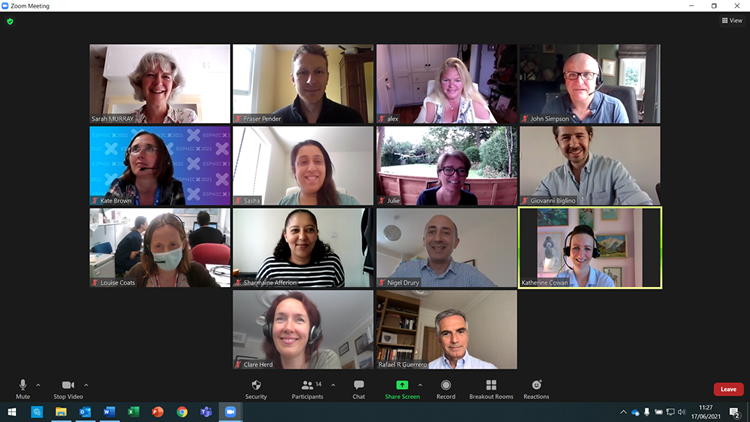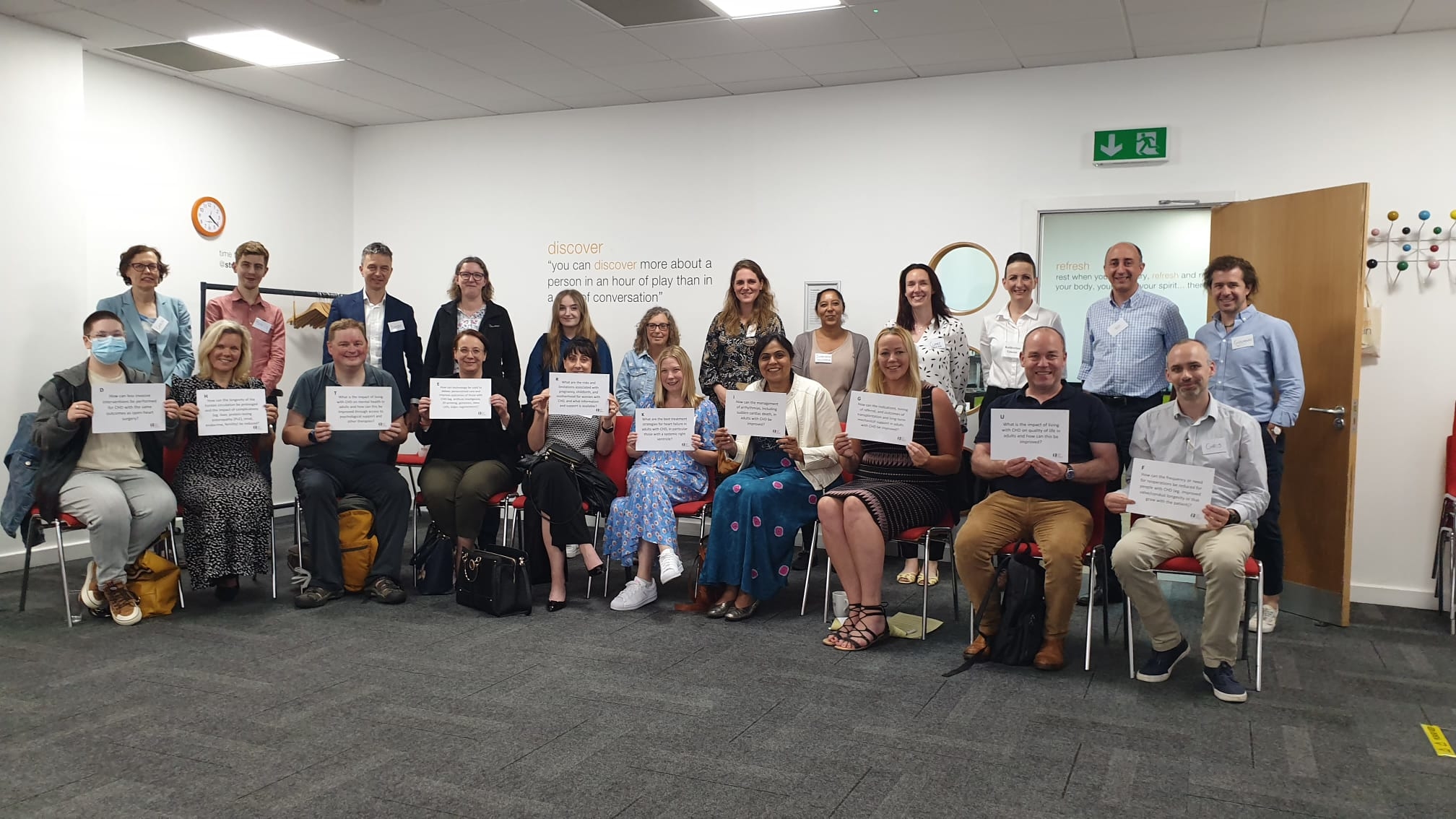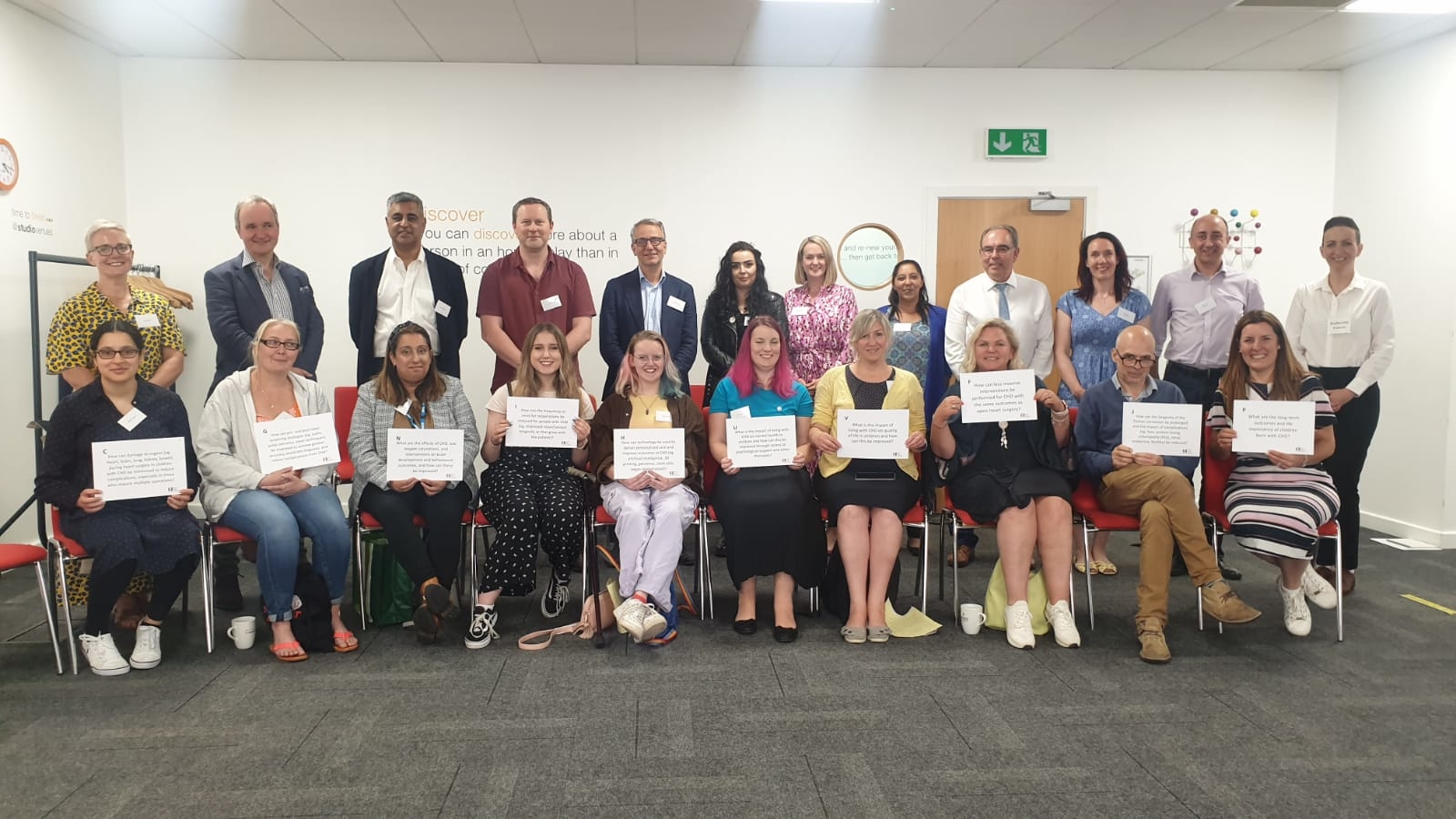Congenital Heart Disease

About this Priority Setting Partnership
The aim of the Congenital Heart Disease PSP was to identify the unanswered questions about congenital heart diseases in adults and children, from patient, carer (primarily parents) and clinical perspectives and then prioritise those that patients, carers and clinicians agree are the most important for research to address.
The PSP asked patients, carers and clinicians about their experiences of the management of congenital heart disease throughout life, including prior to birth, focusing on:
- diagnosis, during pregnancy or after birth
- treatment (medical therapy, catheter intervention, surgery including mechanical support & transplantation, lifestyle, or psychosocial intervention), and
- outcomes of the conditions and/or treatments and the impact on patients and their families, including the physical, psychological, and social effects of living with congenital heart disease
The aim of the final stage of the priority setting process was to prioritise through consensus the identified uncertainties about congenital heart disease in children and adults. The PSP therefore split into two parallel tracks focusing on the fetus/child and the adult, respectively, for the prioritisation stages.
Watch Nigel Drury talking about the PSP on Living the Life on the Islam Channel (from 11 minutes 55 seconds).
The two Congenital Heart Disease Top 10s in Child/Antenatal, and Adults, were published in November 2022.

The image above shows a Steering Group meeting of the Congenital Heart Disease PSP.

The image above shows the workshop in June 2022 to agree the priorities for Adult Congenital Heart Disease.

The image above shows the workshop in June 2022 to agree the priorities for Child/Antenatal Congenital Heart Disease.
Top 10 priorities for child/antenatal congenital heart disease research:
- How can damage to organs (e.g. heart, brain, lung, kidney, bowel) during heart surgery in children with CHD be minimised to reduce complications, especially in those who require multiple operations?
- How can pre- and post-natal screening strategies (e.g. scans, pulse oximetry, novel techniques) be improved to achieve greater accuracy, avoid late diagnosis, and reduce complications from CHD?
- What are the effects of CHD, low oxygen saturations, and interventions on brain development and behavioural outcomes, and how can these be improved?
- How can the frequency or need for reoperations be reduced for people with CHD (e.g. improved valve/conduit longevity or that grow with the patient)? *
- How can technology be used to deliver personalised care and improve outcomes in CHD (e.g. artificial intelligence, 3D printing, genomics, stem cells, organ regeneration)? *
- What is the impact of living with CHD on mental health in children and how can this be improved through access to psychological support and other therapies? *
- What is the impact of living with CHD on quality of life in children and how can this be improved? *
- How can less invasive interventions be performed for CHD with the same outcomes as open-heart surgery? *
- How can the longevity of the Fontan circulation be prolonged and the impact of complications (e.g. liver, protein-losing enteropathy (PLE), renal, endocrine, fertility) be reduced? *
- What are the long-term outcomes and life expectancy of children born with CHD?
The following questions were also discussed and put in order of priority at the child/antenatal CHD final workshop
- What strategies around the time of surgery can improve short-term outcomes in children following surgery for CHD (eg. goal-directed therapy, enhanced recovery, neuromonitoring, anti-inflammatory drugs)?
- What is the role of remote monitoring in CHD to reduce complications and optimise timing of interventions (eg. connected devices, home monitors, mobile apps)?
- What is the impact of a child living with CHD on their parents, siblings and wider family, and what support (psychological, social, other) could be provided?
- How can data be shared effectively and used to identify variations in CHD treatment, develop national guidelines and inform best practice (eg. national registries of rare diseases)?
- How does the perception of themselves, their condition and treatments change in children with CHD as they become older, what influences this and how does it impact on their future healthcare?
- What lifestyle factors (e.g. exercise, diet, or other interventions) may improve health-related outcomes in children with CHD?
- What are the risk factors for complications following surgery for CHD in children and how can these be predicted (eg. genetics, biomarkers)?
- How can antenatal counselling of parents about the diagnosis and implications of CHD be improved?
- How can children with CHD, their families, schools, and the wider public be better informed about the impact of living with CHD?
- What are the indications for extra-corporeal life support (ECLS) following surgery for CHD, how effective is it as a bridge to recovery, and what are the long-lasting effects?
- What are the best approaches to feeding in babies with CHD, to optimise growth, improve outcomes, and reduce parental distress?
- What is the impact of CHD on educational and employment attainments and how can these be improved?
- How can GPs and other healthcare professionals be better informed about CHD?
- What are the most appropriate anticoagulation strategies for children with different types of CHD?
- What other health conditions are associated with CHD and how can these be best managed?
- What are the barriers to conducting multi-centre clinical trials in CHD and how can they be overcome?
Top 10 priorities for adult congenital heart disease research:
- How can less invasive interventions be performed for CHD with the same outcomes as open-heart surgery? *
- How can the longevity of the Fontan circulation be prolonged and the impact of complications (e.g. liver, protein-losing enteropathy (PLE), renal, endocrine, fertility) be reduced? *
- What is the impact of living with CHD on mental health in adults and how can this be improved through access to psychological support and other therapies? *
- How can technology be used to deliver personalised care and improve outcomes of those with CHD (e.g. artificial intelligence, 3D printing, genomics, stem cells, organ regeneration)? *
- What are the risks and limitations associated with pregnancy, childbirth, and motherhood for women with CHD, and what information and support is available?
- What are the best treatment strategies for heart failure in adults with CHD, in particular those with a systemic right ventricle?
- How can the management of arrhythmias, including sudden cardiac death, in adults with CHD be improved?
- How can the indications, timing of referral, and outcomes of transplantation and long-term mechanical support in adults with CHD be improved?
- What is the impact of living with CHD on quality of life in adults and how can this be improved? *
- How can the frequency or need for reoperations be reduced for people with CHD (e.g. improved valve/conduit longevity or that grow with the patient)? *
The following questions were also discussed and put in order of priority at the Adult CHD final workshop
- What is the optimal timing for pulmonary valve replacement in those with pulmonary regurgitation late after complete repair of tetralogy of Fallot?
- What are the long-term outcomes and life expectancy of adults with CHD?
- What are the barriers to conducting multi-centre clinical trials in CHD and how can they be overcome?
- What are the late outcomes for adults living with a Fontan circulation and what is the role of transplantation and its alternatives, including novel therapies?
- What are the most appropriate anticoagulation strategies for adults with different types of CHD?
- What lifestyle factors (e.g. exercise, diet, or other interventions) may improve health-related outcomes in adults with CHD?
- What other health conditions are associated with CHD later in life and how can the risk of these be best managed?
- How can data be shared effectively and used to identify variations in CHD treatment, develop national guidelines and inform best practice (eg. national registries of rare diseases)?
- What are the most important palliative care and end of life care needs for people with CHD and their families and how can these best be delivered?
- What are the best ways to prevent and treat endocarditis in adults with different types of CHD and interventions?
- How can adults with CHD, their families, employers, and the wider public be better informed about the impact of living with CHD?
- What are the effects of CHD, low oxygen saturations, and interventions on brain development and behavioural outcomes, and how can these be improved?
- What is the role of remote monitoring in CHD to reduce complications and optimise timing of interventions (eg. connected devices, home monitors, mobile apps)?
- How can GPs and other healthcare professionals be better informed about CHD?
- What is the role of genetic screening in people with CHD, their siblings and other family members?
- What is the impact of dedicated, centralised programmes for the management of patients with complex CHD (eg. functionally single ventricle) from diagnosis through adulthood, on clinical outcomes and health economics?
* indicates priorities appearing on both lists that are derived from the same summary questions
Document downloads